Ultimate Guide to Heater Options for Your Camper Van
In This Guide:
Do you need a heater in your camper van?
Yes. Even if you aren’t going to spend the winter in the snowy mountains, you would be surprised at how cold some mornings can get all over the country! The question instead should be “how heavy duty of a camper van heater do you need?”. In this guide, we will go through the following options:
- Gasoline and Diesel Air Heaters
- Hydronic Heaters
- Wood Burning Stoves
- Propane Heaters
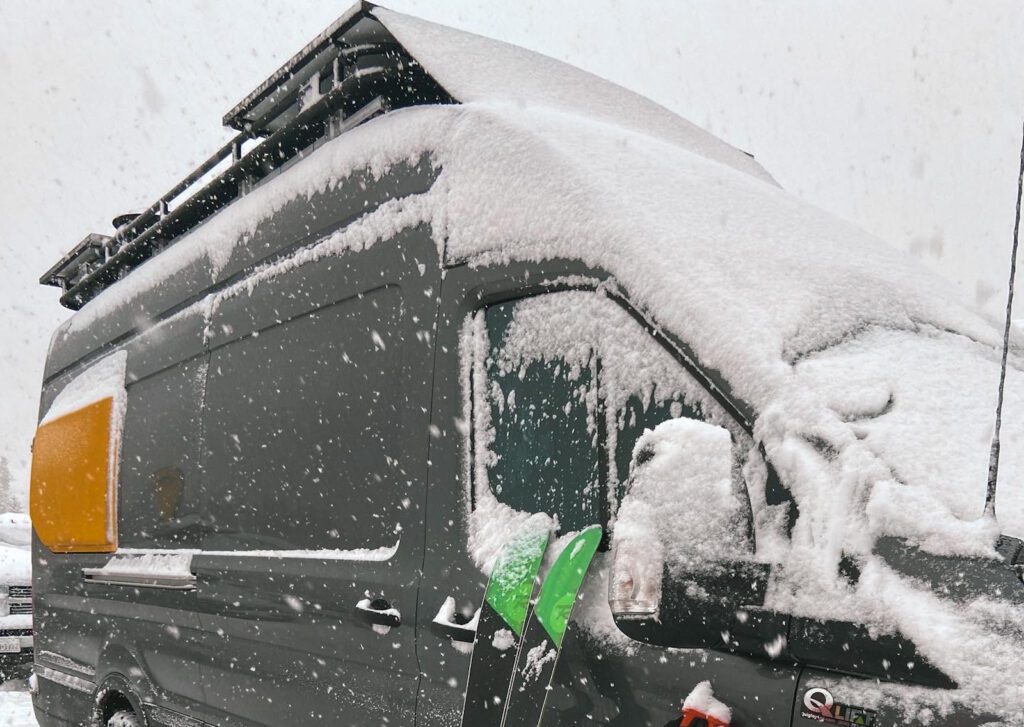
** Disclaimer: This blog post contains various affiliate links that provide a small kickback to us, at no additional cost to you. We truly appreciate your support if you choose to purchase through these! **
Choosing the Right Camper Van Heater
As with most parts of a DIY Van Build, there is no overall “best heater” for van life. Rather, there will be a “best heater for you”. Choosing the right heater for your van life will be a combination of the following factors and how important they are for you:
- Cost
- Effectiveness
- Function at Altitude
- Ease of Install
Notes on Purchasing Camper Van Heaters
Several of the heaters we discuss, notably Webasto and Eberspaecher, are not US made heaters which makes it incredibly difficult to source “authorized” heaters from them. While they are incredible heaters and the ones that we recommend, this can be tricky.
A lot of companies (Heatso, sellers on Amazon, etc) will sell them at great prices but if you look closer, they are not authorized dealers, or they sometimes substitute their own cheaper parts (Amazon). Therefore, if you run into issues down the line, the native companies will not be able to support you, or provide warranty.
You can buy from wherever you prefer; however, we have to share this disclaimer and we will only be sharing links in the below sections to authorized sellers. We have personally been victimized by this issue so we hope we can prevent you from having similar issues!
Camper Van Heater Options
All of the options below, except the Mr Buddy Heater, output a DRY heat which is essential to condensation control. Especially in the winter. If you opt for a heater not in this guide, we encourage you to be sure that it vents outside and produces a dry heat, not a wet heat.
1. Gas, or Diesel, Camper Van Air Heaters
First up are the most common heaters you see in camper vans: Gas and Diesel Air Heaters. These are compact units that often sit underneath your passenger seat. They hook into your existing fuel source (gas tank) and require a small amount of 12V power routed to them. These heaters produce hot air through a single output.
Diesel Heaters for Van Life:
- Eberspaecher Airtronic S2-D2L (2.2kW)
- Autoterm Air 2D (2kW)
- (cheaper option)
- Autoterm Air 4D (4kW)
- (cheaper option)
- Eberspaecher Airtonic M2-D4L (4kW)
- Webasto 2000 STC Diesel
- CDH, “Chinese Diesel Heaters” (Buy at your own risk! We have never tried these but many folks have them)
Gasoline Heaters for Van Life:
- Eberspaecher Airtronic S3-B2L (2kW)
- Eberspaecher Airtronic M2-B4L (4kW)
- Webasto 2000 STC Gasoline
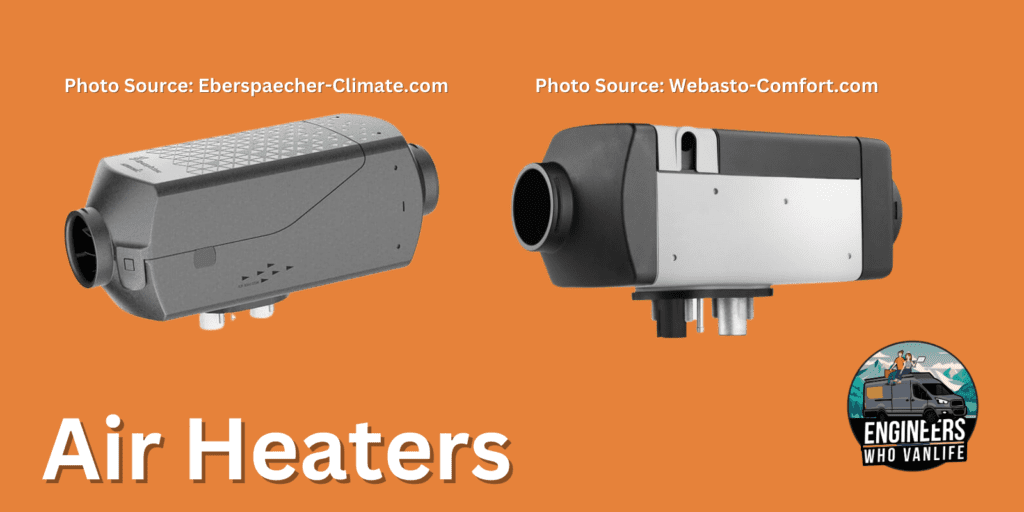
How Do Gas/Diesel Air Heaters Work?
This type of camper van heater typically works in the following way:
- Fuel is pumped to the heater to ignite a glow plug
- A small flame is lit inside a contained combustion chamber which heats a heat exchanger
- Fresh air is pulled from outside your camper van, combusted in the heater, and the exhaust is vented outside.
- Then air from inside your campervan is blown along the hot heat exchanger unit and distributed into the living quarters.
Cost
These camper van air heaters range from $1,000 to $2,000 depending on the model and size, and having a professional install them can easily run your another $1,000+ (But that’s why you’re here!).
Pssst! We offer installation of air heaters for a reasonable rate!
Effectiveness
Depending on the model, these produce anywhere from 6,500 – 14,000 BTU. These air heaters produce hot air at only a single outlet, so circulation may be uneven throughout your camper van. Most of the below heaters allow for a range of heat output on a dial, not just “off” or “on”.
Common Air Heaters and Their Output:
- Eberspaecher Airtronic S2-D2L – 7,500 BTU
- Eberspaecher Airtonic M3-D4L – estimated 13,600 BTU
- CDH, “Chinese Diesel Heaters” (Buy at your own risk! We have never tried these but many folks have them) – ranges
- Eberspaecher Airtronic M2-B4L – estimated 13,600 BTU
- Autoterm Air 2 – 6,8000 BTU
- Autoterm Air 4 – estimated 13,600 BTU
Function at Altitude
Of all the camper van heaters in this guide, gas/diesel air heaters struggle the most above 5,000. As you go up in altitude, there is less oxygen in the air. Thus, these heaters then have to decrease their “fuel sipping” rate to maintain the proper fuel to oxygen ratio. Because these camper van air heaters already sip so little fuel, they often don’t have much wiggle room to sip less. Therefore, most air heaters are rated to 5,000 feet only.
Some will have manual adjustments you can make to use them slightly above 5,000 feet which do work, however, you will need to be conscious of cleaning out carbon buildup if you do this.
We offer Air Heater install services in and around our shop in Colorado! For more details, check out this page.
Ease of Install
With some patience and thorough manual reading, these heaters can be absolutely be installed by any DIY van builder. The crux of the install includes:
- Drilling a hole in your floor for the base of the heater to sit
- Routing 12v power to the heater and the fuel pump
- Tapping into your existing fuel tank and routing fuel back to the heater after a fuel pump
- Many new chassis have an auxiliary fuel port that you can use, but installer beware! They are not as effective as the included standpipe! In Ford Transits, the included 2mm straight standpipe will be much easier for your fuel pump to siphon from as opposed to the OEM 6mm corrugated fuel tube that Ford uses. This will cause problems at altitude when fuel delivery rates are decreases.
What type of Van Lifer is it best for?
We recommend gas heaters and diesel heaters for most van lifers! For their price, they provide a reliable and effective form of dry heat that is excellent for camper vans.
2. Hydronic Heaters
Hydronic heating systems provide various heating elements on the basis of a coolant loop. They are a great option for van lifers as they can not only produce hot air, but also on demand hot water, and heated floors with little extra work, all in one compact system.
Examples:
- Eberspaecher AquaSystem (currently Diesel only, Gas coming soon!)
- Timberline System
- AquaHot 125G (or 125D for diesel)
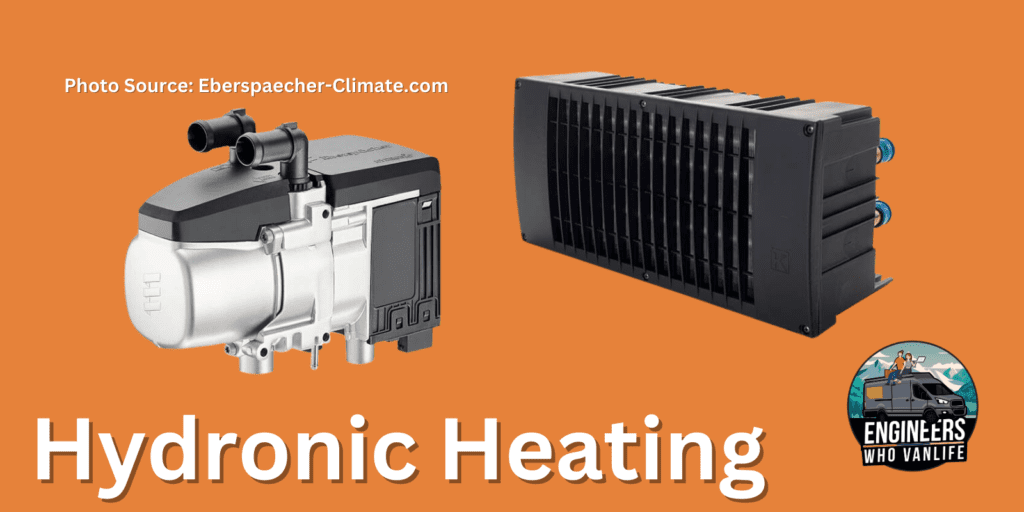
How Do Hydronic Heaters Work?
Hydronic heating systems work off of heated coolant that circulates around a “loop” and enters various heat exchangers. The heat exchangers take coolant in and then output hot air, or hot water. You can also create heated floor loops! For van life, coolant reservoirs are typically isolated and standalone. However, you can alternatively splice into your chassis coolant system.
Hydronic heating is energy efficient, works at high altitudes, and has a much higher heat output than air heaters.
Cost
Cost is one of the reasons we do not recommend these to everyone. Hydronic heaters come in around $4,000 – $6,000.
- Eberspaecher AquaSystem (currently Diesel only, Gas coming soon!)
- Timberline System
- AquaHot 125G (or D for diesel)
Effectiveness
Hydronic heating systems heat camper van interiors extremely well due to not only their large size, but their larger (and multiple) output vents. Most hydronic heating systems have temperature sensors and the ability to control the actual temperature of your living space with a thermostat. This saves power and will allow you to leave the van for longer periods of time with comfort.
Function at Altitude
Hydronic heating systems are rated to much much higher altitudes than standard air heaters. Usually they are rated between 10-16k feet.
Ease of Install (Difficult!)
Install is another limiter to choosing a hydronic heating system. They are complex (see below) and require understanding of coolant loops. However, most camper van conversion companies can install one for you as a one-off project. This will increase cost, but gets the job done! If you’re taking the job on yourself, separate the project into two parts:
- First, you’re going to install the heater half of the project. This will include the burner unit, fuel pump, 12V power, and all the wiring harnesses.
- Once you have that working you can move on to the coolant loop. You will be using a combination of heater hose (typically either 5/8″ or 3/4″), and PEX tubing if you are rocking in-floor heat. Be sure to use spring clamps that match your heater hose diameter and pick up a hose clamp tool as well! Do NOT use worm clamps. They are prone to loosening over time as you drive and as your hoses expand and contract over time, and will ultimately start to leak!
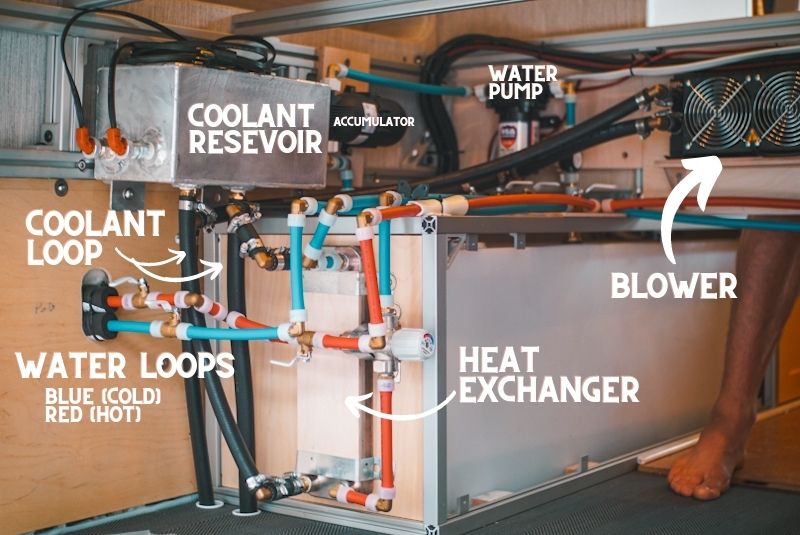
What type of Van Lifer is it best for?
Budget is the biggest limiter with installing a hydronic heater in your camper van. If they weren’t so expensive we would recommend them for everyone because of their efficiency, and how they enable on demand hot water with no extra effort or space. However, because of the cost, we recommend hydronic heaters for:
- Powder chasing van lifers with the budget! Especially if you will spend a majority of your winter at elevation.
- Or, if on demand hot water is a requirement for your van build and you are already going to dedicate space and budget to it.
3. Wood Burning Stoves
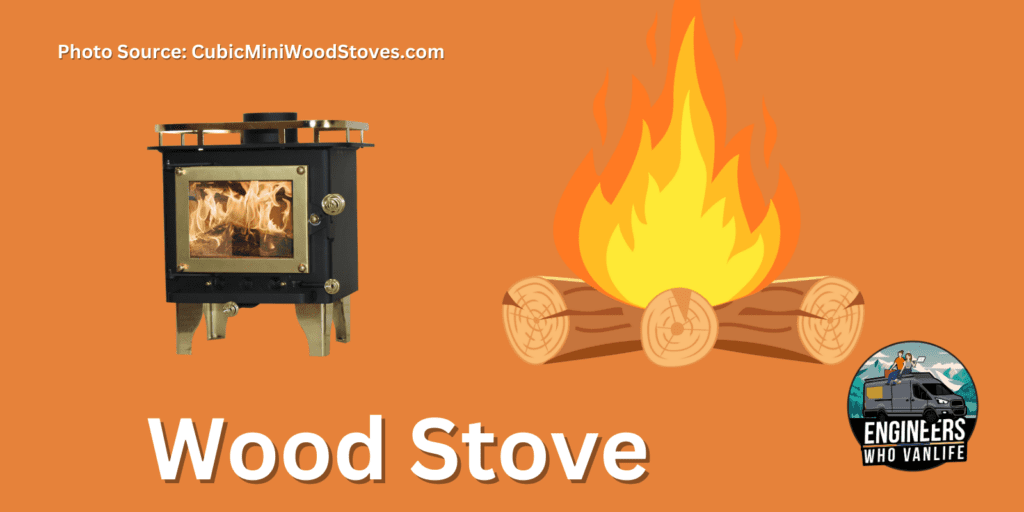
How do Wood Burning Stoves Work?
Tiny wood burning stoves like the Cubic Mini use the most basic form of heat: fire! They work just as any wood stove does, but are safe for small, moving spaces like a camper van. And, they produce very little smoke due to the secondary combustion system.
Cost
The total cost of the wood stove and the (mandatory) flue system will run you about $700-$800. This is without any accessories like heat shields and fans.
Cubic Mini
Cubic Mini is the most reliable maker of tiny woods stoves for boats and small spaces.
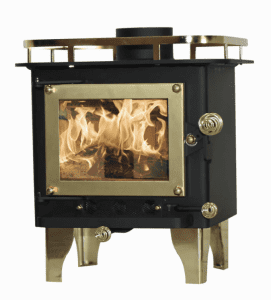
Effectiveness
Heat output ranges from 6,000 – 14,000 BTUs. Several reviews mention having the optional EcoFan helps disperse the warm air throughout the van a lot better than without.
Function at Altitude
Fires work at any altitude, so you are set here! Just make sure you keep extra air flow. And, that you do not transport firewoods across borders.
Ease of Install
Tiny Wood Stoves are simple compared to the other heater options in this guide. They need no power, or fuel connections! Therefore, all you need to do is physically install the stove, cut into your roof for the flue, and be sure you comply with all clearance and heat shield requirements. While you should read the complete install guide, here are a few of the clearance needs you will have:
- 30 inches to ceiling (or add heat shield)
- 40 inch total flue length (produces proper draft)
- 20 inches of clearance on all sides to combustable materials (or add heat shield)
What type of Van Lifer is it best for?
Tiny wood burning stoves are absolutely amazing for coziness and aesthetic value. However, we really only recommend them to the van lifer who:
- Stays in one spot for multiple weeks or months. It is not recommended to drive with any hot coals!
- Loves the art of firewood hunting and keeping a fire going. You cannot cross borders, even state borders, with firewood!
Linnea and Akela’s winter in the Northwoods is the perfect example of what to install a Tiny Wood Stove for. However, if you are resort hoping and chasing powder, this is likely not going to be for you.
4. Propane Heaters
There are two categories of propane heaters: the emergency “off the shelf” heater, and Propex heaters.
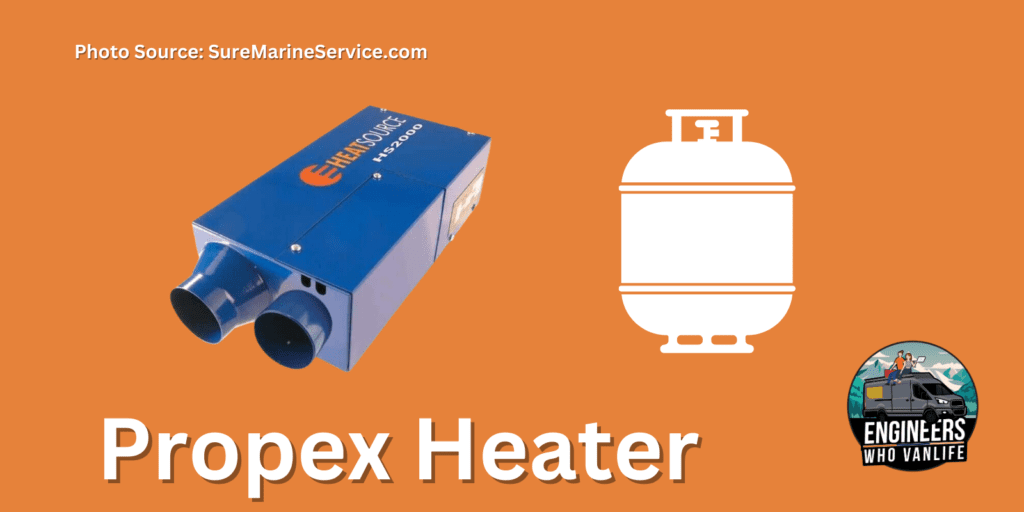
How does the Propex Heater work?
The Propex HS2000 Air Heater is similar to gas heaters and diesel air heaters discussed first. The main difference is that propane is the fuel source instead of your gas tank. This does lead to a cleaner burn, thus maintenance should be easier. However, we have heard that the heat output it much less for propane heaters. For this reason, we only recommend a Propex heater if you currently have a solid propane system on board.
Cost
~ $1,100
Effectiveness
By the numbers, the HS2000 runs about 6,500 BTU. However, most reviews suggest this heater to be good at “warming” a van to above freezing, not keeping it cozy. And, that on really cold nights, it struggles to keep up.
Function at Altitude
According to specifications these work up to 10,000 feet with no modifications. Propane is a cleaner burn compared to diesel and gas, which prevents carbon buildup common with gas and diesel heaters at elevation.
Ease of Install
This is a DIY Van Builder friendly installation similar to the complexity of a gas, or diesel, air heater. You will need to cut a hole in your floor for the base of the unit, route propane to it, and route 12v power to it.
What type of Van Lifer is it best for?
We only recommend a Propex heater if you currently have a a propane system on board for cooking or hot water. We don’t think it makes sense to install a propane system just for heating.
In their 2023 study, TheVanConversion.com found that 91% of people have a heater installed in their van. Of those, 22% are LPG – with the Propex HS2000 being the most popular choice by far.
“I’m a big fan of the HS2000, it has excellent fuel efficiency, low power consumption, is thermostatically-controlled, and is cheaper than most diesel heaters. Propex’s customer support is also known for being top-notch.”
– Shane, TheVanConversion.com
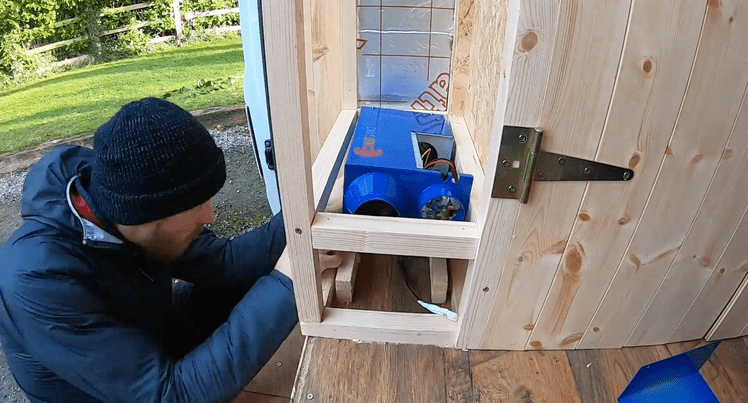
5. Mr Buddy Heaters
Sometimes there isn’t time, or budget, to install a proper heater in your camper van. In this scenario, we often see van lifers buy a Mr. Buddy, or similar heater as an interim solution when mornings start to get cold. While this works in a pinch, there are a few important considerations:
- You must have a window, or other form of vent open at all times when running this to vent CO
- Never leave this heater unattended
- This heater is not vented outside, therefore, is not a dry heat and will increase humidity inside your rig
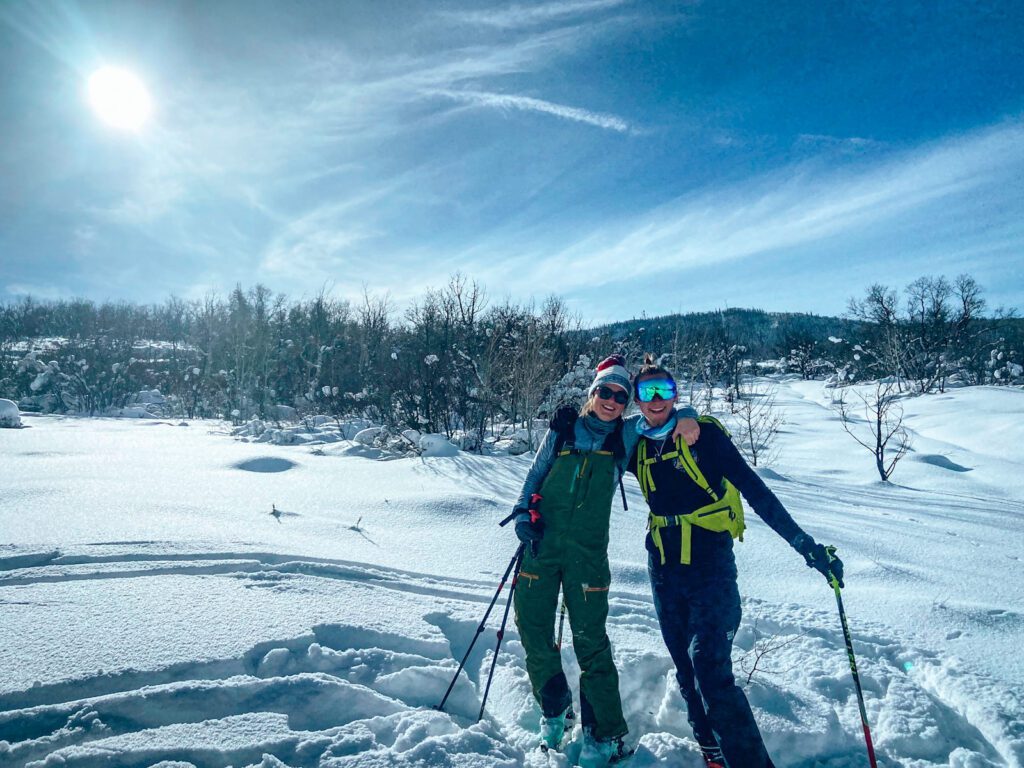
Which camper van heater is best for your van life?
If you are still unsure which camper van heater is right for you, we have put together a short, and decisive, list for you. As always, we are happy to discuss this, or any of your DIY van build questions, just schedule a time to chat here!
- Best if budget is #1 concern: Gas/Diesel Heater
- Best function at altitude: Hydronic heater
- Best for chasing the depths of winter: Hydronic heater
- Best for a mild van life winter: Gas/Diesel heater
- Best for mild winters if propane system already exists: Propex heater
- Best for last minute install: Mr. Buddy heater
- Best if you know you want hot water frequently, too: Hydronic heater
What about heated floors in camper vans?
Heated floors are becoming more popular as van life electrical systems become more beefy. Believe it, or not, but floors get extremely cold in camper vans because of the air flow beneath the van.
The two best options for heated floors right now in camper vans are 12V heated mats, or hydronic heating loops. We cover both of these options in detail in a separate guide: Camper Van Heated Floor Options.
CO Alarms
When any type of combustion is going on in, near, or around, your van, you need CO alarms. Even though most of the camper van heaters above vent outside, cargo vans are not air tight and there is always the possibility the perfect draft comes along and blows that air inside.
We keep one CO alarm in our living space, and another in our garage. And, yes(!) ours has gone off before.
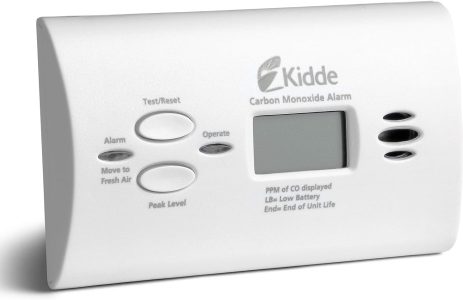
Insulation Considerations for Winter Van Life
While a good heater is important for staying warm in your camper van, it is also important to have thorough insulation to hold in that generated heat. Nothing shows insulation gaps more so than a below freezing day. If you plan on doing Winter van life, you need to be extra careful and thorough during the insulation phase of your van build. Learn all about insulation here.
Additionally, keeping a fan running during the winter is crucial for condensation control. It is tempting to keep your heat locked into your camper van by keeping windows and fans close. However, if you do this, all the condensation from breathing and cooking will freeze to your walls and the inside of your windshield.
Winter Van Life Deep Dive
Heaters are just one part of van life in the cooler months. If you are looking to chase the cold this upcoming winter, we recommend that you check out our full Winter Van Life Guide where we discuss:
- How to find camping spots in the winter
- Useful items to have on board your camper van in the winter
- Altitude considerations
- How to deal with more time inside
- Ski resorts you can sleep at
- & more!
Next Up:
Complete Guide to Winter Van Life
Thanks for being here! Happy building!
Eric + Colby
✉️ Join our mailing list for more content!
🙏🏽 If you are looking for more 1:1 van build help, we are here to help via Consulting or Travel Van Building.
[Start Here] Beginner Guides:
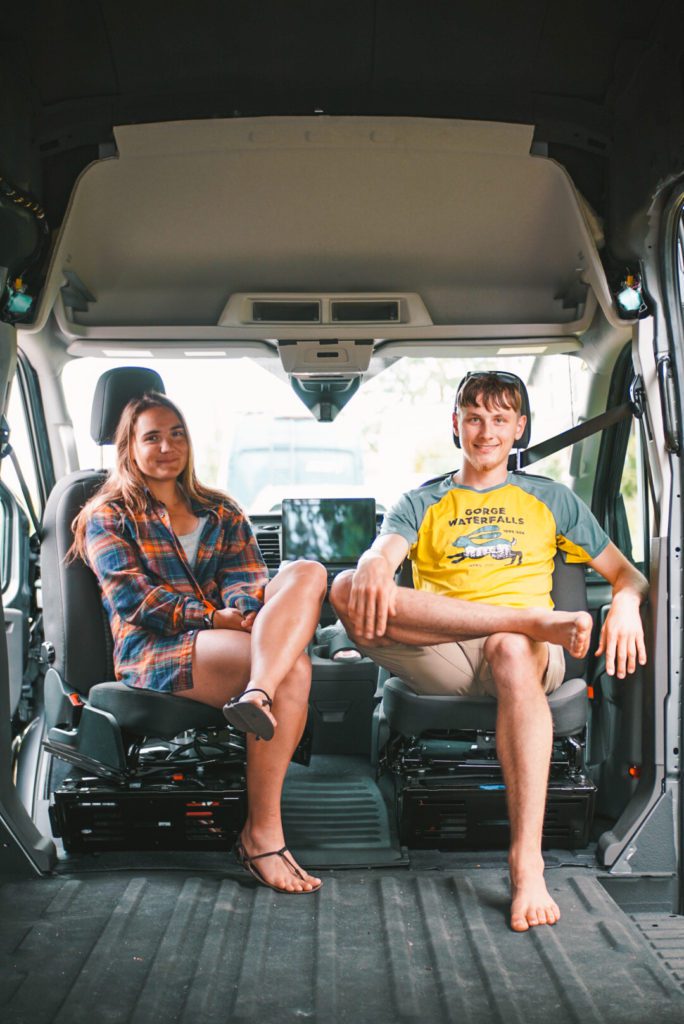


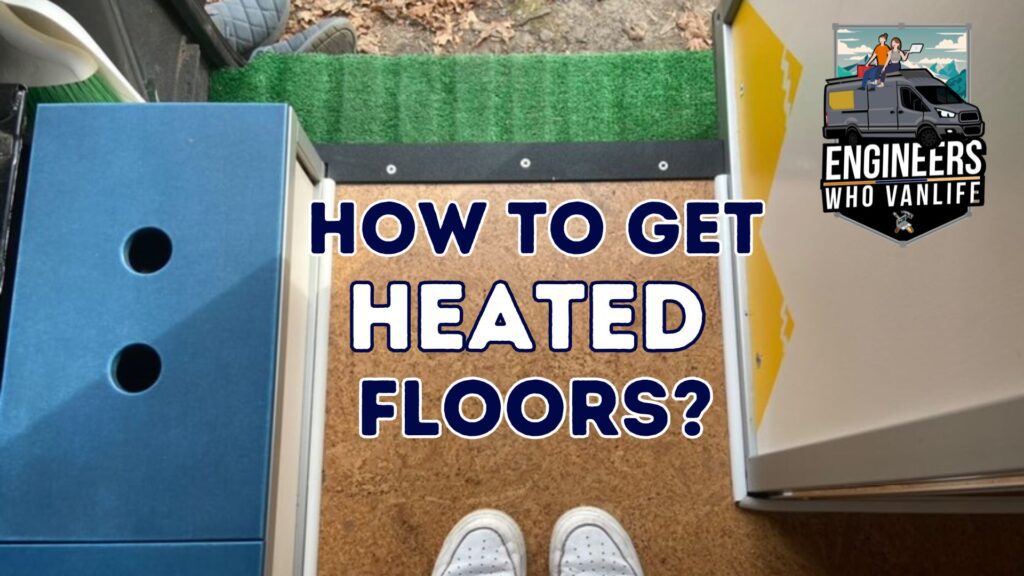
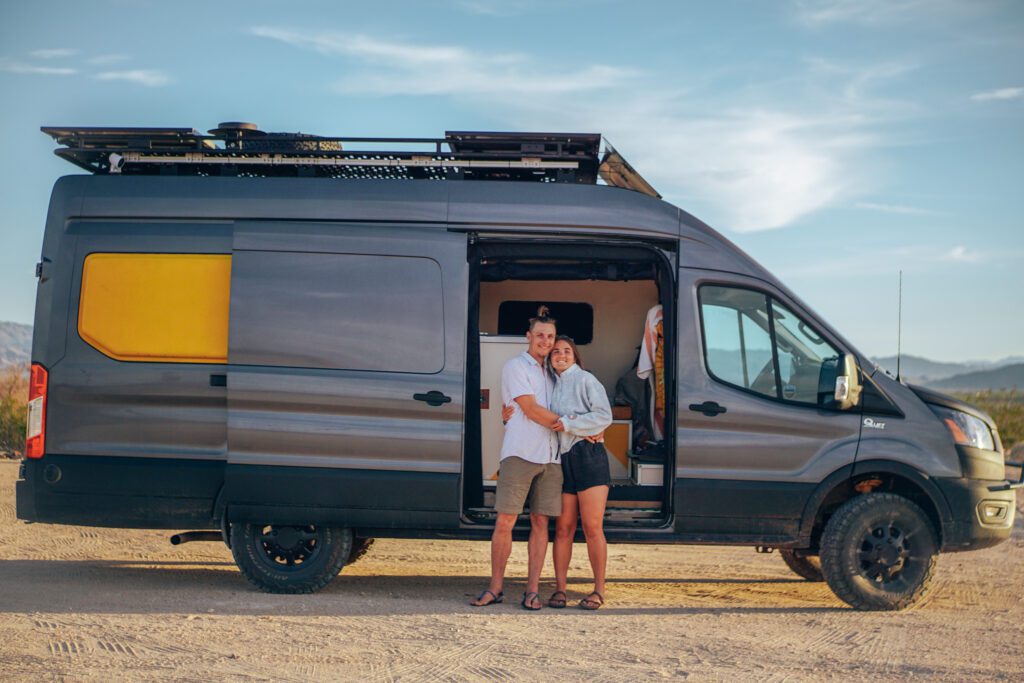




Comments 6
I have a Dodge Caravan 94 I’m living out of this winter coming up I’m in St.louis city and homeless for now and was last winter and last winter I used a karaseen heater was told bad idea but my response was witch one is better freezing or death I chose choice # 2 what do you think would be best heating source
I’m trying to get better to go back to work bad hip 😫
Author
Mr Buddy heaters are your cheapest bet as long as your keep your space vented (crack a window), and be careful not to tip it over. Alternatively, you could look into 12v heated blankets!
In regards to a propex heater. What do you consider ( mild winter ). Also what do you mean by having a propane system already installed?
Author
I would consider “mild winter” as not chasing cold weather and snow, but might be in it along your travels. And, having a propane system already installed means that you are already using propane in your camper van for something else like hot water, or cooking.
Thanks for another great resource! How often do y’all refill your hydronic heating system’s coolant reservoir? Also, do you have a way you monitor the coolant level?
Author
Hey! We installed a small “overflow” container to visibly catch any coolant that escapes. That is currently how we monitor, and we actually haven’t seen any in there in over a year. Generally, you should check your levels once a year, unless you experience a large leak, but you shouldn’t need to top off much!